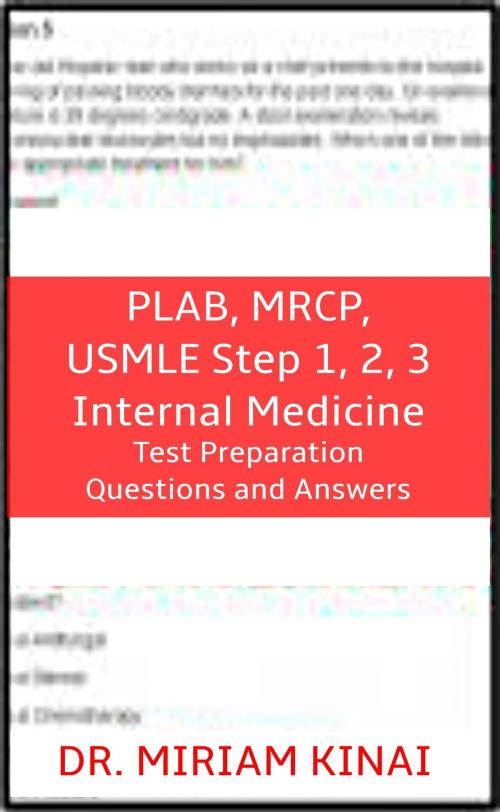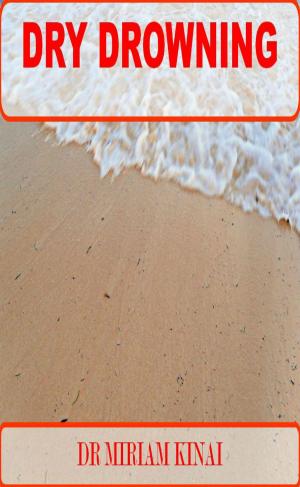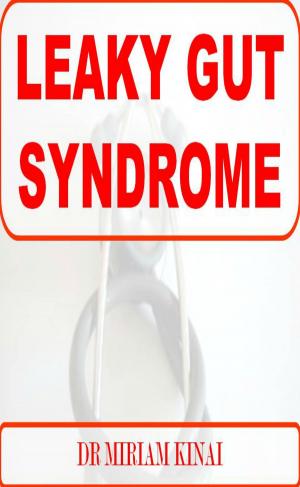PLAB, MRCP, USMLE Step 1, 2, 3 Internal Medicine Test Preparation Questions and Answers
Nonfiction, Health & Well Being, Medical, Reference, Test Preparation & Review| Author: | Miriam Kinai | ISBN: | 9781458118691 |
| Publisher: | Miriam Kinai | Publication: | June 8, 2011 |
| Imprint: | Smashwords Edition | Language: | English |
| Author: | Miriam Kinai |
| ISBN: | 9781458118691 |
| Publisher: | Miriam Kinai |
| Publication: | June 8, 2011 |
| Imprint: | Smashwords Edition |
| Language: | English |
PLAB, MRCP, USMLE Step 1, 2, 3 Internal Medicine Test Preparation Questions and Answers is filled with high quality, high yield questions and detailed answers to help you pass your professional exams.
BOOK EXCERPT
- A 50-year-old Caucasian woman presents to the hospital complaining of tingling sensations in her hands and legs for the past one month. She is not on any medications. She has had one previous admission for a jejunoileal bypass. She is a married clerk, and does not drink alcohol, smoke cigarettes, or use illicit drugs. What is the most likely diagnosis?
A. Celiac disease
B. Whipple disease
C. Short bowel syndrome
D. Tropical sprue
E. Lactose intolerance
Correct Answer C
Short bowel syndrome is usually the result of surgical resection of the intestines or jejunoileal bypass. The malabsorption is a result of inadequate absorptive surface. Malabsorption of vitamin B12 results in paraesthesias while malabsorption of calcium results in bone pain and carpopedal spasms.
Lactose intolerance results from deficiency of lactose which is a disaccharidase in the mucosal cells of the small intestine which splits the disaccharide lactose into glucose and galactose. Patients complain of borborygni, flatulence, nausea, abdominal cramps, pain, and diarrhea after ingesting lactose containing food like milk. Laboratory investigations reveal that the diarrheal stools are acidic. When the hydrogen breath test is administered, there is elevated hydrogen content in the expired air as the colonic flora digests the unabsorbed lactose.
Treatment includes following a lactose-free diet.
Celiac disease is a hereditary disorder caused by gluten intolerance. Gluten is found in wheat, rye, barley, and oats. Patients may be asymptomatic or may present with diarrhea, abdominal discomfort, distention, and steatorrhea in which their stools are pale, malodorous and difficult to flush as they float on the toilet water. They may have anemia from iron and folate deficiency, osteomalacia and bone pains from calcium deficiency, and edema from hypoproteinemia. Laboratory investigations may reveal elevated alkaline phosphatase and prolonged prothrombin time. Diagnosis is confirmed by small intestine mucosal biopsy showing a flat mucosa due to villous atrophy and by subsequent improvement on a gluten-free diet. Specific treatment includes a gluten-free diet.
Tropical sprue is an acquired disease which affects both visitors and natives to tropical areas such as the Caribbean and South India. Its etiology is not known.
Patients usually present with diarrhea. They may also complain of weight loss and report that their stools are soft and bulky in steatorrhea. They may also develop deficiencies of folate and cobalamin. Stool microscopy should be done to look for cysts and trophozoites Histological examination of small bowel mucosal biopsy aids in making the diagnosis. Treatment is with tetracycline or oxytetracycline.
Whipples disease, which mainly affects men, is caused by the bacterium Tropheryma whippelii. It is a multisystemic disease which affects the small intestines, joints, brain, heart and eyes. Patients can present with diarrhea, steatorrhea, abdominal pain, weight loss, and joint pains. On examination they may be pale, with lymphadenopathy. Histological examination of small bowel mucosal biopsy reveals PAS positive foamy macrophages. Treatment is with trimethoprim-sulfamethoxazole or chloramphenicol.
PLAB, MRCP, USMLE Step 1, 2, 3 Internal Medicine Test Preparation Questions and Answers is filled with high quality, high yield questions and detailed answers to help you pass your professional exams.
BOOK EXCERPT
- A 50-year-old Caucasian woman presents to the hospital complaining of tingling sensations in her hands and legs for the past one month. She is not on any medications. She has had one previous admission for a jejunoileal bypass. She is a married clerk, and does not drink alcohol, smoke cigarettes, or use illicit drugs. What is the most likely diagnosis?
A. Celiac disease
B. Whipple disease
C. Short bowel syndrome
D. Tropical sprue
E. Lactose intolerance
Correct Answer C
Short bowel syndrome is usually the result of surgical resection of the intestines or jejunoileal bypass. The malabsorption is a result of inadequate absorptive surface. Malabsorption of vitamin B12 results in paraesthesias while malabsorption of calcium results in bone pain and carpopedal spasms.
Lactose intolerance results from deficiency of lactose which is a disaccharidase in the mucosal cells of the small intestine which splits the disaccharide lactose into glucose and galactose. Patients complain of borborygni, flatulence, nausea, abdominal cramps, pain, and diarrhea after ingesting lactose containing food like milk. Laboratory investigations reveal that the diarrheal stools are acidic. When the hydrogen breath test is administered, there is elevated hydrogen content in the expired air as the colonic flora digests the unabsorbed lactose.
Treatment includes following a lactose-free diet.
Celiac disease is a hereditary disorder caused by gluten intolerance. Gluten is found in wheat, rye, barley, and oats. Patients may be asymptomatic or may present with diarrhea, abdominal discomfort, distention, and steatorrhea in which their stools are pale, malodorous and difficult to flush as they float on the toilet water. They may have anemia from iron and folate deficiency, osteomalacia and bone pains from calcium deficiency, and edema from hypoproteinemia. Laboratory investigations may reveal elevated alkaline phosphatase and prolonged prothrombin time. Diagnosis is confirmed by small intestine mucosal biopsy showing a flat mucosa due to villous atrophy and by subsequent improvement on a gluten-free diet. Specific treatment includes a gluten-free diet.
Tropical sprue is an acquired disease which affects both visitors and natives to tropical areas such as the Caribbean and South India. Its etiology is not known.
Patients usually present with diarrhea. They may also complain of weight loss and report that their stools are soft and bulky in steatorrhea. They may also develop deficiencies of folate and cobalamin. Stool microscopy should be done to look for cysts and trophozoites Histological examination of small bowel mucosal biopsy aids in making the diagnosis. Treatment is with tetracycline or oxytetracycline.
Whipples disease, which mainly affects men, is caused by the bacterium Tropheryma whippelii. It is a multisystemic disease which affects the small intestines, joints, brain, heart and eyes. Patients can present with diarrhea, steatorrhea, abdominal pain, weight loss, and joint pains. On examination they may be pale, with lymphadenopathy. Histological examination of small bowel mucosal biopsy reveals PAS positive foamy macrophages. Treatment is with trimethoprim-sulfamethoxazole or chloramphenicol.















